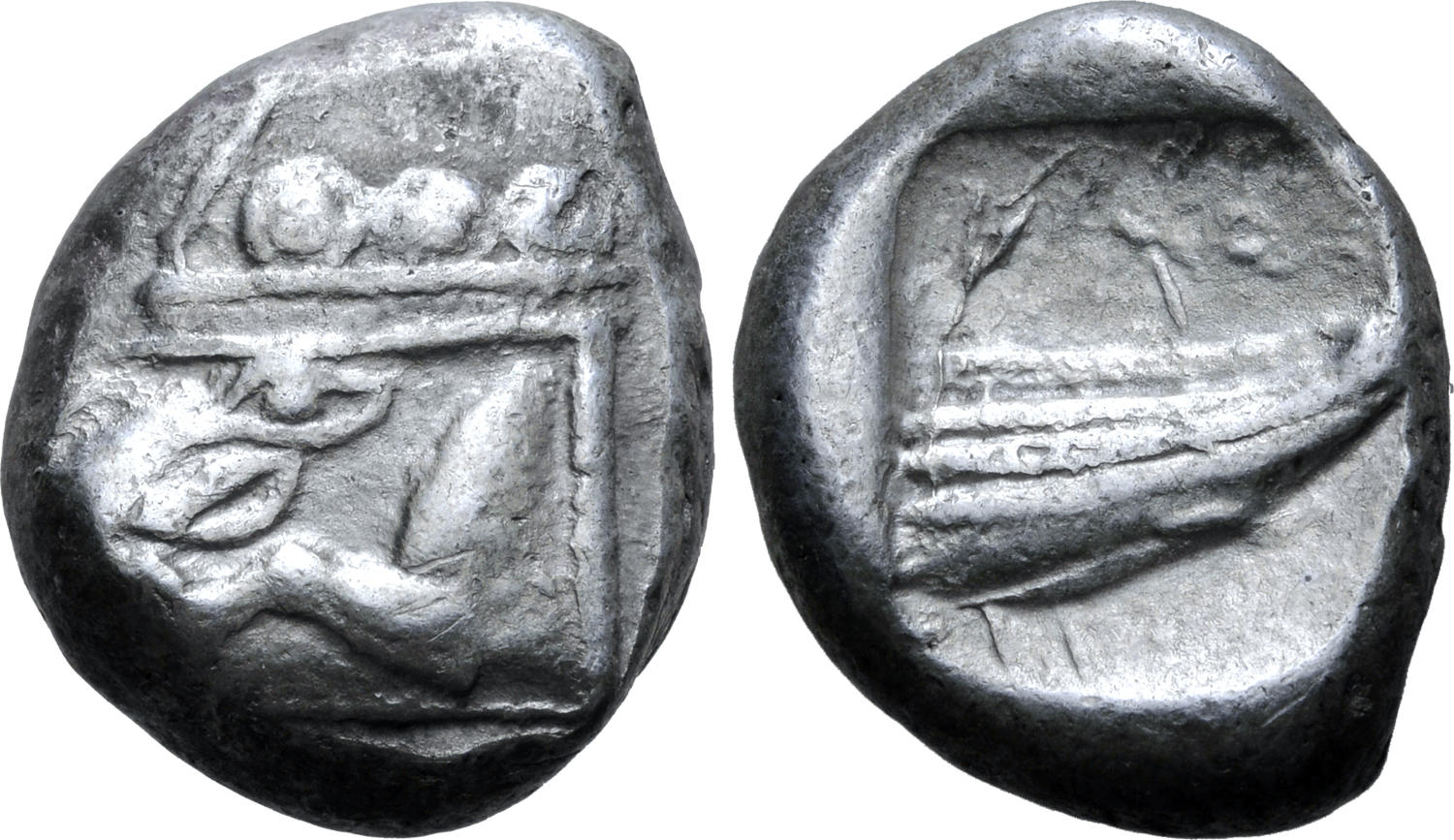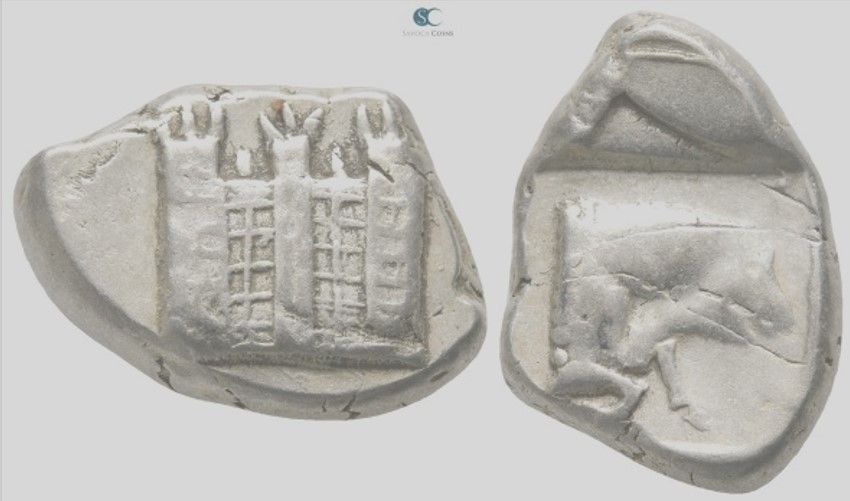2448 - Cilicia (uncertain mint) (walls/bull) over Phaselis (prow/stern) (Savoca, 30, Jan. 2019, 163)
From SILVER
| (One intermediate revision by the same user not shown) | |||
| Line 1: | Line 1: | ||
{{Overstrike | {{Overstrike | ||
|Image overstriking coin=Cilicia_2448_Savoca.jpg | |Image overstriking coin=Cilicia_2448_Savoca.jpg | ||
| − | |Image overstruck variety= | + | |Image overstruck variety=Phaselis 3 globules.jpg |
| + | |Image reference overstruck variety=https://pro.coinarchives.com/a/lotviewer.php?LotID=1606506&AucID=3397&Lot=413 | ||
|Sale=Savoca Numismatik GmbH & Co., 30th silver auction, 27 Jan. 2019, 163 | |Sale=Savoca Numismatik GmbH & Co., 30th silver auction, 27 Jan. 2019, 163 | ||
|Obverse description=Crenelated city walls with three towers. | |Obverse description=Crenelated city walls with three towers. | ||
| Line 16: | Line 17: | ||
|Denomination=double siglos | |Denomination=double siglos | ||
|Standard=Persian | |Standard=Persian | ||
| − | |Overstruck obverse description= | + | |Overstruck obverse description=Prow terminating in a boar’s forepart, with 3 shields |
| − | |Overstruck reverse legend= | + | |Overstruck reverse legend=ΦAΣ |
|Overstruck reverse legend language=Greek | |Overstruck reverse legend language=Greek | ||
| − | |Overstruck reverse description= | + | |Overstruck reverse description=Stern of galley to right; all within incuse square |
| − | |Overstruck mint= | + | |Overstruck mint=Phaselis |
| − | |Overstruck ancient region= | + | |Overstruck ancient region=Lycia |
|Overstruck authority=Persian Empire | |Overstruck authority=Persian Empire | ||
| − | |Overstruck date from= | + | |Overstruck date from=520 BCE |
| − | |Overstruck date to= | + | |Overstruck date to=500 BCE |
|Overstruck period=Classical | |Overstruck period=Classical | ||
|Overstruck denomination=double siglos | |Overstruck denomination=double siglos | ||
|Overstruck standard=Persian | |Overstruck standard=Persian | ||
| − | |Coin series reference overstruck= | + | |Coin series reference overstruck=SNG von Aulock Lykien, 4391 ; Heipp-Tamer 1993, n° 3 |
| − | |Coin series web reference overstruck=https://greekcoinage.org/iris/id/ | + | |Coin series web reference overstruck=https://greekcoinage.org/iris/id/phaselis_heipp-tamer_1993_3 |
|Frequency of overstrikes=frequent | |Frequency of overstrikes=frequent | ||
|Level of confidence=sure | |Level of confidence=sure | ||
|Remarks=nb: no mention of overstrike | |Remarks=nb: no mention of overstrike | ||
}} | }} | ||
Latest revision as of 12:23, 15 August 2023
455 BCE - 400 BCE
Images
Overstruck variety

Phaselis 3 globules.jpg [1]
Location/history
| Sale(s)Sale(s) ᵖ: | Savoca Numismatik GmbH & Co., 30th silver auction, 27 Jan. 2019, 163 | |
Overstriking coin
Description
| ObverseInscription or printing placed on the obverse.: | Crenelated city walls with three towers. | ReverseInscription or printing placed on the reverse.: | Forepart of bull right within incuse square. |
Mint and issuing power
| MintIdentifies the place of manufacture or issue of a numismatic object.: | Cilicia (uncertain mint) | Ancient regionAncient region. | Cilicia | Modern countryModern country: Turkey | AuthorityIdentifies the issuing power. The authority can be "pretended" when the name or the portrait of X is on the coin but he/she was not the issuing power. It can also be "uncertain" when there is no mention of X on the coin but he/she was the issuing power according to the historical sources: | Persian Empire |
Chronology
| FromIdentifies the initial date in a range assigned in a numismatic context. 455 BCE toIdentifies the final date in a range assigned in a numismatic context.. 400 BCE | Classical 480-323 BC |
Physical description
| MetalThe physical material (usually metal) from which an object is made.: Silver |
WeightWeight of the numismatic object (in grams). in grams: 10.9110.91 g <br />10,910 mg <br /> | DenominationTerm indicating the value of a numismatic object. Examples: tetradrachm, chalkous, denarius.: double siglos |
|
| DiameterDescribes diameter of an object (in mm).: 2222 mm <br />2.2 cm <br /> | StandardStandard.: Persian | ||
References
| Coin referenceReference of the Coin: | Coin series referenceReference to coin series study: |
Overstruck type
Description
| ObverseInscription or printing placed on the obverse.: | Prow terminating in a boar’s forepart, with 3 shields | ReverseInscription or printing placed on the reverse.: | ΦAΣ (Greek) Stern of galley to right, all within incuse square |
Mint and issuing power
| MintIdentifies the place of manufacture or issue of a numismatic object. ᵖ: | Phaselis | Ancient regionAncient region. ᵖ | Lycia | Modern countryModern country: Turkey | AuthorityIdentifies the authority in whose name (explicitly or implicitly) a numismatic object was issued. ᵖ: | Persian Empire |
Chronology
| FromIdentifies the initial date in a range assigned in a numismatic context. 520 BCE toIdentifies the final date in a range assigned in a numismatic context.. 500 BCE | Classical 480-323 BC |
Physical description
| DenominationTerm indicating the value of a numismatic object. Examples: tetradrachm, chalkous, denarius. ᵖ: | double siglos |
StandardStandard. ᵖ: | Persian |
References
| Coin type referenceReference to coin series study ᵖ: | SNG von Aulock Lykien1SNG von Aulock Lykien, 4391, Heipp-Tamer 19932Heipp-Tamer 1993, n° 3 | ||
| Coin series web reference overstruckCoin series web references overstruck: | |||
Additional data
| Frequency of overstrikesFrequency of overstrikes: | frequent | Level of confidenceLevel of confidence of the identification: | sure |
| RemarksRemarks: | nb: no mention of overstrike | ||
